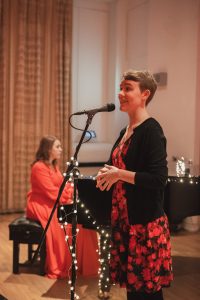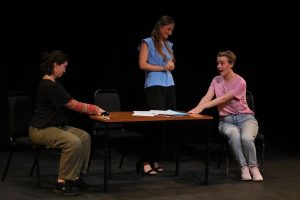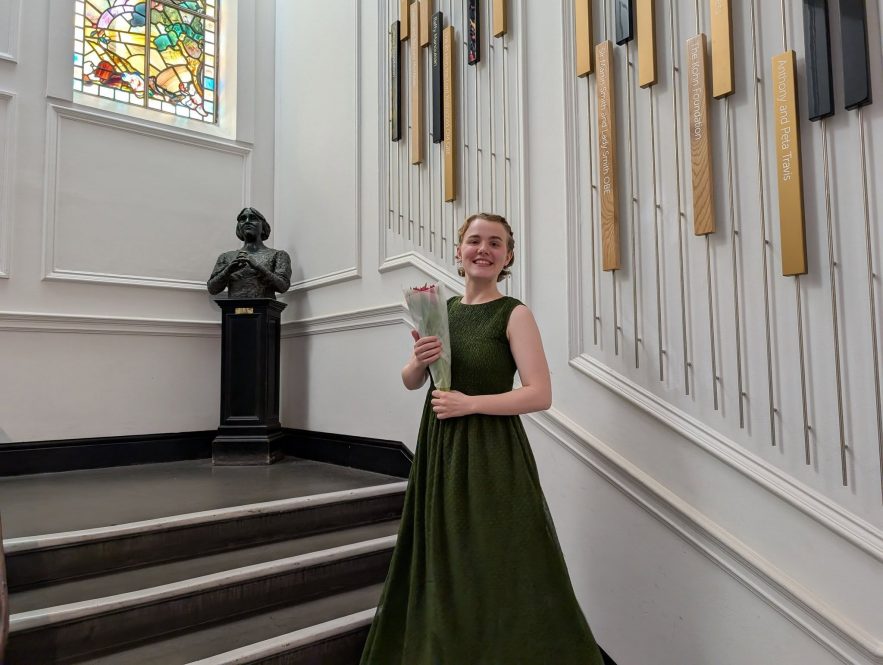UConn graduate Sarah Marze ’23 (SFA) recently returned to Connecticut after spending the past two years at the Royal Academy of Music in London as a Marshall Scholar.
“I am grateful to have spent my two years collaborating with some of the best classical musicians in the world,” says Marze. “Now that I am back home, I am eager to share what I’ve learned and put into practice the new philosophies, aesthetics, and dreams I’ve encountered during my Marshall Scholarship.”
Marze, an honors scholar who was UConn’s sixth Marshall Scholar in its history and fifth since 2008, earned a master’s degree from the Royal Academy and was completely immersed in her studies and the various projects assigned to her.

Her interest lies in vocal and music composition, and she believes that her undergraduate education at UConn helped prepare her for her experience in London.
“I did a lot of student-led projects at UConn like writing an opera that was produced by the UConn Opera Theater,” says Marze. “That was so useful for doing an opera project in London, as I was doing a lot of the same things. I started the UConn Composer Ensemble Consortium, a club that is still running, that fosters collaboration between performers and composers. I learned there how to produce concerts, how to book venues and rehearsals. I felt like I was better prepared for a wide breadth of things than people who went to a music conservatory for their undergraduate education.
“The experience of studying and living in the metropolitan cultural hub that is London for two years has completely changed my life and helped me form friendships with musicians across the world,” continues Marze. “It opened my mind to very different artistic perspectives.”
Marze began the 2024-25 academic year with the completion of her first symphony orchestra piece. This piece was inspired by the jazz harmonies Marze studied at UConn and by observing rehearsals of Igor Stravinsky’s music with the London Symphony Orchestra.
She also finished her first professional commission in the United Kingdom, which was a set of opera scenes in collaboration with Scottish writer Jen McGregor based on the Scottish Witch Trials and witch-pricking craze.
Marze completed an internship with the Waterperry Opera Festival in Oxfordshire, where she learned skills relating to the artistic and administrative direction of a summer opera festival.
“This inspired my dream of creating a summer opera festival in Connecticut,” says Marze. “My desires were further amplified and tested through serving as the lead producer for a triple bill of new operas developed at the Academy in the previous academic year for the Tête à Tête opera festival in London.”
She composed an opera called “The District,” which dealt with how individuals might respond to creativity within an authoritarian regime, which was performed at that triple bill of operas.
“I was moved by several Marshall Scholars being in the audience, especially as I gave my performance debut as a singer in one of the other pieces that night,” says Marze. “The musicians I met through Waterperry and Tête à Tête then came together for a new project I organized for January, which brought the music of American composer Charles Ives to a sold-out recital at the Royal Academy in partnership with new works by my peers.”
Marze said the Royal Academy provides an incentive to work in an unstructured and do-it-yourself manner and master’s students are able to claim credit for outside projects on a final portfolio of professional skills toward degree progress.

“The environment at a U.K. conservatory, especially the Academy, was the perfect laboratory for growing my creative practice,” says Marze. “My lessons at the Academy supported collaborative endeavors and helped me keep true to a rigorous technique and discipline while balancing many ongoing projects.”
Marze finished another project in March 2025 as she composed a 10-minute work for the world-renowned Riot Ensemble.
Another highlight was completing a commission for the Academy’s percussion department.
“This work was an adventurous use of percussion instruments and one of my favorite things I’ve written in terms of character and musical content,” says Marze.
She finished her academic requirements with a speed-composition exam in which she wrote a four-minute piece called “Luster” for four instruments and conducted a recording session all within a week’s time.
“I left the Academy with a diverse portfolio of music in collaboration with some of the finest musicians in the world,” says Marze. “It’s an opportunity that I had not completely understood the weight of until this year.”
Since moving back to Connecticut, she also has been making progress on her thesis project. “I chose to focus on choral music in response to my continued singing with two participatory choirs in London – the Goldsmiths Choral Union and the High Holborn Chamber Choir,” says Marze. “While primarily being a fantastic source of friendship and weekly community, these choirs also became a platform for new compositions that will feature as case studies in my thesis project on text-setting and accessible experimentalism in choral music.
“Access to the famous excellence of the English choral tradition and repertoire has completely transformed my aesthetics and perspectives for the better, which I hope will influence my artistic practice in the United States as well. My additional volunteer involvement with the CityLit Inclusive Choir and Choir with No Name allowed me additional insights into the innovative community music practices in the United Kingdom that I wish to take back to the United States.”



